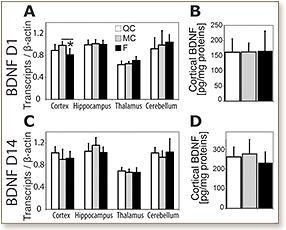
Study Objectives: Sleep fragmentation (SF) is an integral feature of sleep apnea and other prevalent sleep disorders. Although the effect of repetitive arousals on cognitive performance is well documented, the effects of long-term SF on electroencephalography (EEG) and molecular markers of sleep homeostasis remain poorly investigated. To address this question, we developed a mouse model of chronic SF and characterized its effect on EEG spectral frequencies and the expression of genes previously linked to sleep homeostasis including clock genes, heat shock proteins, and plasticity-related genes. Design: N/A. Setting: Animal sleep research laboratory. Participants : Sixty-six C57BL6/J adult mice. Interventions: Instrumental sleep disruption at a rate of 60/h during 14 days Measurements and Results: Locomotor activity and EEG were recorded during 14 days of SF followed by recovery for 2 days. Despite a dramatic number of arousals and decreased sleep bout duration, SF minimally reduced total quantity of sleep and did not significantly alter its circadian distribution. Spectral analysis during SF revealed a homeostatic drive for slow wave activity (SWA; 1-4 Hz) and other frequencies as well (4-40 Hz). Recordings during recovery revealed slow wave sleep consolidation and a transient rebound in SWA, and paradoxical sleep duration. The expression of selected genes was not induced following chronic SF. Conclusions: Chronic sleep fragmentation (SF) increased sleep pressure confirming that altered quality with preserved quantity triggers core sleep homeostasis mechanisms. However, it did not induce the expression of genes induced by sleep loss, suggesting that these molecular pathways are not sustainably activated in chronic diseases involving SF.